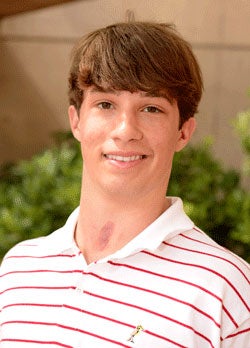Head Injuries
Before May 26, 2011, 17-year-old Walker McCain was an all-star cross-country runner for Mountain Brook High School. But the race of his life began on that day after he flipped over the handlebars of his bicycle, slid almost 75 feet and struck his head on a large rock. “I had gone over to a friend’s house that afternoon because my dad had suggested I go running,” Walker recalls. “But I chose to ride my bike instead. The one bad choice I made was walking past two helmets in our basement on the way to my bike.” Walker’s C-3 vertebra was fractured and he suffered extensive brain injuries in the wreck. He was taken to UAB where doctors fitted him with a halo to stabilize his neck injury and placed him on a ventilator. Walker’s parents, Amy and Byron, were devastated. In an email to friends a few days after the wreck, Byron wrote: “I am trying to find some sense in why this happened and I am lost. I am trying to believe this is a race God says Walker has to run and there is a purpose for this challenge. At track meets, we push our children to catch the next runner, break a personal best time, finish the race or maybe even win the race. To each person who reads this message, we need you to do your part to encourage Walker to win this race. He HAS to win this race.” As weeks passed and Walker lay unconscious and heavily sedated, his parents had to decide where their son should continue his recovery. After touring three rehabilitation facilities, they chose Children’s of Alabama as the best place for Walker to receive inpatient therapy. “Our decision to place Walker in the care of Children’s and its rehab specialists was absolutely the correct decision,” Byron says today. “The inpatient treatment provided to Walker was first class, and the follow-up outpatient therapy through Children’s South kept him moving forward so he could start school in mid-August with his fellow students.” “We cannot say enough nice things about Dr. Drew Davis (medical director for the Division of Pediatric Rehabilitation Medicine at Children’s) and the physical, occupational and speech therapists,” Amy adds. “They were all wonderful and put Walker through his paces.” Keeping Walker in Birmingham where his friends could visit him on a daily basis also contributed to the success of his rehab, according to his parents. “Walker was very fortunate to have a group of about six friends who visited him daily,” Byron says. “They became a part of the recovery process by giving him someone to show his improvement to each day. We also were blessed by an army of parents who are our friends. They helped by staying with Walker in the hospital during the day and also by lending us their support and encouragement.” Walker was transferred from UAB to Children’s of Alabama on June 13 – and on that very day, he began to regain consciousness. Rev. Susan Clayton, associate pastor at Independent Presbyterian Church, who visited with the McCains almost every day of Walker’s hospitalization, happened to be there at the time. “Byron asked Walker several questions and he answered them all correctly,” she recalls. “He answered in one-word responses, and his speech was slow and somewhat slurred, but he was talking! He responded to Byron's ‘I love you’ with an ‘I love you, too.’ ‘Walker is in there,’ I remember thinking. ‘He is on his way.’” Walker’s recovery continued, and he was released from Children’s on June 24. At a follow-up visit a week later, his neurosurgeon told the McCains he expected their son would make a 100% recovery – and soon it became apparent that Walker would be ready to start school with his classmates. “I used a race analogy at the beginning of all this – and it is unbelievable how many people have cheered for Walker,” Byron said at the time. “Starting school is like entering the stretch run to the finish line.” Today, almost two years after the wreck, victory truly is in sight for Walker. He is a freshman at the University of Alabama and he runs again now for exercise. His recovery is near complete, although his right hand still tires a bit more easily than before his accident. He also has become a huge proponent of bicycle safety. “He stops people on campus who are riding a bicycle without a helmet, tells them what happened to him and encourages them to wear a helmet,” Amy says. “He also congratulates people he sees riding a bike with a helmet!” Walker says it’s all about helping others avoid the type of injuries he suffered. “My parents tell the story about when I first regained consciousness – how after they asked me a question, they would turn around and cry after each answer,” Walker says. “I really can’t imagine how much stress it put on everyone to have to deal with something like that.” “Doctors said that had I been wearing a helmet, the majority of things that happened to me would not have happened – most likely would not have broken my neck, lost consciousness or lost a whole summer. The one thing I tell people now is: ‘Wear your helmet – no matter what.’ Some people make think it’s un-cool, but it really can save your life.”







